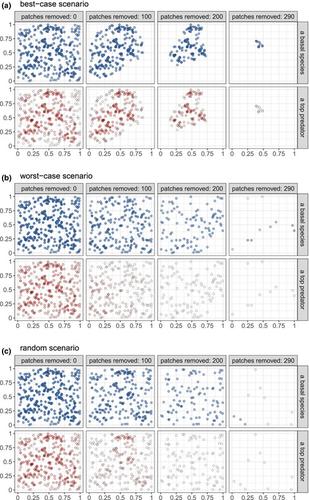当前位置:
X-MOL 学术
›
Ecol. Lett.
›
论文详情
Our official English website, www.x-mol.net, welcomes your feedback! (Note: you will need to create a separate account there.)
A Bayesian network approach to trophic metacommunities shows that habitat loss accelerates top species extinctions.
Ecology Letters ( IF 8.8 ) Pub Date : 2020-09-27 , DOI: 10.1111/ele.13607 Johanna Häussler 1, 2 , György Barabás 3, 4 , Anna Eklöf 3
Ecology Letters ( IF 8.8 ) Pub Date : 2020-09-27 , DOI: 10.1111/ele.13607 Johanna Häussler 1, 2 , György Barabás 3, 4 , Anna Eklöf 3
Affiliation

|
We develop a novel approach to analyse trophic metacommunities, which allows us to explore how progressive habitat loss affects food webs. Our method combines classic metapopulation models on fragmented landscapes with a Bayesian network representation of trophic interactions for calculating local extinction rates. This means that we can repurpose known results from classic metapopulation theory for trophic metacommunities, such as ranking the habitat patches of the landscape with respect to their importance to the persistence of the metacommunity as a whole. We use this to study the effects of habitat loss, both on model communities and the plant‐mammal Serengeti food web dataset as a case study. Combining straightforward parameterisability with computational efficiency, our method permits the analysis of species‐rich food webs over large landscapes, with hundreds or even thousands of species and habitat patches, while still retaining much of the flexibility of explicit dynamical models.
中文翻译:

贝叶斯网络对营养元社区的研究表明,栖息地的丧失加速了主要物种的灭绝。
我们开发了一种新颖的方法来分析营养型元社区,使我们能够探索渐进的生境丧失如何影响食物网。我们的方法将零散景观上的经典种群模型与营养相互作用的贝叶斯网络表示相结合,以计算局部灭绝率。这意味着我们可以将经典的种群概化理论的已知结果重新用于营养性的元社区,例如根据景观对它们对元社区的持久性的重要性,对景观的栖息地进行排序。我们以此为例研究了栖息地丧失对模型群落和植物哺乳动物塞伦盖蒂食物网数据集的影响。将直接的参数可设置性与计算效率相结合,
更新日期:2020-11-12
中文翻译:

贝叶斯网络对营养元社区的研究表明,栖息地的丧失加速了主要物种的灭绝。
我们开发了一种新颖的方法来分析营养型元社区,使我们能够探索渐进的生境丧失如何影响食物网。我们的方法将零散景观上的经典种群模型与营养相互作用的贝叶斯网络表示相结合,以计算局部灭绝率。这意味着我们可以将经典的种群概化理论的已知结果重新用于营养性的元社区,例如根据景观对它们对元社区的持久性的重要性,对景观的栖息地进行排序。我们以此为例研究了栖息地丧失对模型群落和植物哺乳动物塞伦盖蒂食物网数据集的影响。将直接的参数可设置性与计算效率相结合,


























 京公网安备 11010802027423号
京公网安备 11010802027423号